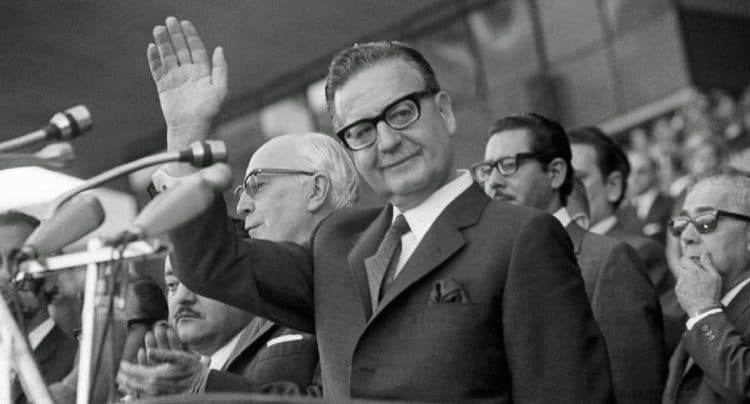28 de enero 2021

Children of Exile: The Births “Sowing Hope” in the Camp of Nicaraguan Farmers

PUBLICIDAD 1M
PUBLICIDAD 4D
PUBLICIDAD 5D
The key to the “Chilean road to Socialism” was the implementation of far-reaching social reforms without abandoning the constitutional framework.

Salvador Allende.
Fifty years ago, from the balcony of the Chilean Student Federation, Salvador Allende said to his followers. “I ask you to understand that I am just a man, with all the frailties and weaknesses that a man has. And if I could withstand the defeat of yesterday, because I was fulfilling a task, today without arrogance and without any spirit of revenge, I accept this triumph that has nothing personal in it.”
Allende’s humbleness as a political leader is one of the virtues that distinguishes him within the history of the Latin American left. It was the fourth time that that surgeon, born in Santiago in 1908, aspired to the presidency. On three occasions, 1952, 1958 and 1964, he was defeated, although in the third he got 38% of the votes. That was more than those that gave him victory in 1970, as candidate of the Popular Unity Coalition. He ran against former president Jorge Alessandri and the Christian Democrat Radomiro Tomic.
The lack of arrogance made him say that it came from defeat. But the truth is that he had achieved fundamental triumphs for the left within the Chilean democracy. Founder of the Socialist Party in 1933, not the Communist Party created by Luis Emilio Recabarren in 1922, Salvador Allende was Minister of Health of the Popular Front government headed by Pedro Aguirre Cerda between 1938 and 1941. After leading his party, the doctor arrived at the Chilean Senate in 1945. In the 60s, he held the presidency of the upper house, until he launched his candidacy in the 1970 elections.
In Conversation with Allende (1971), Regis Debray let the president speak, who insisted that the victory of Popular Unity, where the socialists partnered with the communists, social democrats, radicals and progressive Christians, would not have been possible without that tradition of the democratic left that went back to the first decades of the 20th century. Allende’s faith in democracy and pluralism was strong enough to withstand four electoral campaigns. Moreover, he made no attempt to violate freedom of expression and association during the three years his government lasted.
The key to the so-called “Chilean road to Socialism” was the implementation of far-reaching social reforms. These included the nationalization of copper, carbon, iron, saltpeter and steel. Likewise, radicalization of the agrarian reform initiated by the administrations of Jorge Alessandri and Eduardo Frei. While the State took control of 90% of the banking assets through the nationalizations, he never abandoned the constitutional framework of 1925 or altered the representative government or the party system.
In the conversation with Debray, Salvador Allende always maintained that his differences with the Cuban Revolution, with Fidel Castro and Che Guevara, were tactical. However, at various times he noted his multiple disagreements with the communists. His idea of socialism was not at odds with good relations with the entire international community, with the reading of Trotsky, with his refusal to assume Leninism as a “political catechism” or with criticism of the one-party model.
He never renounced calling what he was trying to promote in Chile “revolution.” However, he referred to the Popular Unity project as an alternative for the construction of socialism with democracy. Juxtapose the great communist experiences of the 20th century: the Soviet, Chinese or Cuban. The coup d’état which overthrew Allende in September 1973, and which led to his immolation, contributed to spread the thesis that democratic socialism is doomed to failure.
In his Interrupted Conversation with Allende (1998), the Chilean sociologist Tomas Moulian argued that until 1989 that thesis of the failure of the moderates had some validity. However, the world after the fall of the Berlin Wall and the Eastern bloc, says Moulian, did nothing more than vindicate Salvador Allende. The “legacy of revolution achieved by peaceful means” and of “radical reformism in democracy” is more alive than ever throughout the world.
*This article was originally published in “La Razon,” from Mexico.
Archivado como:
PUBLICIDAD 3M
Historiador y ensayista cubano, residente en México. Es licenciado en Filosofía y doctor en Historia. Profesor e investigador del Centro de Investigación y Docencia Económicas (CIDE) de la Ciudad de México y profesor visitante en las universidades de Princeton, Yale, Columbia y Austin. Es autor de más de veinte libros sobre América Latina, México y Cuba.
PUBLICIDAD 3D